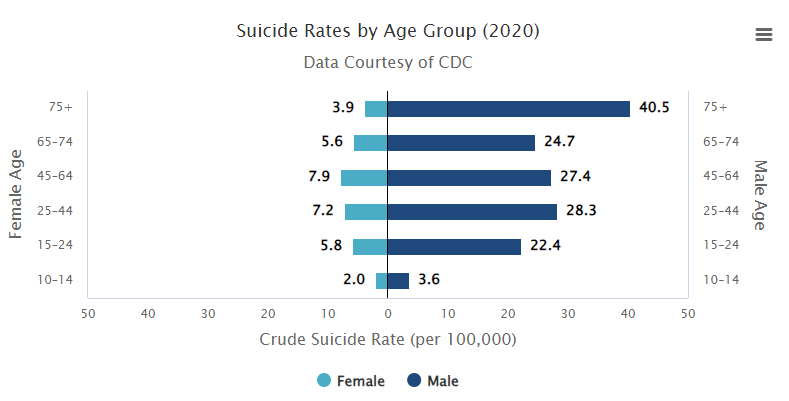Whether he’s your partner, father, brother, son, or friend, men often avoid discussing their feelings. He might feel like he’s a burden for sharing problems, feel judged for considering therapy or medication, or feel that if he 'toughs it out', the feelings will subside.
There’s strong evidence that men suffer from mental health conditions at similar rates as women, but they don't seek help as often. In fact, 4 out of 5 deaths by suicide are men and the rate among young men is growing. Having a conversation with your male loved one is the best place to start helping him. You don’t need any special training to initiate the discussion. Simply consider a few of these prompts to keep the lines of communication open.
Share the Differences You’ve Noticed
Mental health challenges are not always as obvious as physical ones. But changes in behavior, mood, and energy are good indicators that there’s a problem. Prompt the man in your life to open up by stating an observation.
- “You seem a little upset lately, what’s up?”
- "I haven't heard from you much lately so I wanted to call and catch up. How have you been?"
- “Is work still going well? You seem a bit stressed.”
By noticing a simple change, you can show your concern without making assumptions that could cause him to feel defensive or cornered. For men who have a hard time talking directly about their feelings, this can be an effective way to work toward the emotional part of an issue by talking about surrounding factors first.
Lift Tension by Doing Two Things at Once
Many men feel uncomfortable in the hot seat: A direct confrontation might push him away further. To avoid the heat of what he might perceive as an intervention, spark up a conversation casually while you’re on a walk, doing a home project together, or going on a drive.

Walking has more benefits than you might think. It’s a way to lighten the tension of a vulnerable conversation, and walking itself has been proven to relieve stress, improve cognition, and decrease feelings of anxiety and depression.
Be a Friend, Don’t Mend
You don’t have to fix his problems; acknowledging his struggles and being present will mean a lot. It can be difficult to open, especially if you think the person you’re talking to won’t understand. Remember that what he’s going through is real to him, and be the supportive friend you’ve always been. When you acknowledge how difficult it must feel, keep an open ear. Do not dismiss or attempt to solve his problems, you are moving mountains by way of gaining his trust.
Share Your Own Experiences
Some men bottle up their feelings because they don’t want to burden others with their problems. He may opt to ‘figure it out’ on his own to avoid feeling awkward, weak, singled out, or different. Phrases like “tough it out” and “whining is weak” only exacerbate these perceptions some men have.
You can help to dismantle the stereotypes about “toughness” by sharing your own mental health experiences and what helped you through them.
- “I finally put my foot down and set some boundaries at work. I've noticed that if I don't set limits with my energy, I will undoubtedly burn myself out.”
- “Talking to my mom really helped me feel better about how my sister treated me. I was so angry, but I can see things from her perspective now.”
- “After the baby was born, I remember wanting to disassociate much more than I ever had. I should have felt joyful but I felt sadness, then shame. I recognize this was an imbalance in my brain and it's really common.”
By sharing your own experience, you not only help to normalize the subject of mental health but you also help your loved one feel safe and understood.
Ask Him Again
What’s the first thing he will say if you confront him? “I’m fine.”
According to a 2019 survey of men in the UK, only 75% of men would openly tell their friends if they were struggling with their mental health, with the majority preferring to make up an excuse.
This data shows that, despite 64% of men considering themselves to be good communicators, mental health is still a difficult topic to discuss with just under half (42%) not wanting to seem a burden to their friends.
Concerns like doubting whether people really want to hear the honest answer and not wanting to burden others were cited as the main reasons people avoided these conversations. However, that second ask might be the prompt he’s been waiting for to finally talk about it. It shows him that you are genuinely interested and present.
It’s important to reduce the stigma around mental health. Mental health is important for everyone, and we should all remember to keep the door open to the people we care about most. If the man in your life is willing to seek help, we have a variety of primary care providers across all ages, genders, and backgrounds. View our providers here and schedule an initial visit at clinics throughout Northern Utah.





.4).2511050842400.png)
.jpg.2511241144379.webp)